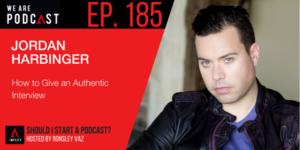Being an interviewer is not just about asking questions. If you have an interview format on your podcast, or even if you give one occasionally, it’s essential to put the work in and create authentic interviews.
If your interviews are generic or fake, or if you’re just going through the motions to get it done, your audience will be able to tell. And they’ll tune out.
On a recent episode of Should I Start a Podcast, seasoned podcaster Jordan Harbinger schooled us on the art of interviewing. Interviewing guests is not something that comes naturally to most. In fact, most podcasters are shocked at how hard you have to work at interviewing, especially at first. I know I was.
Thankfully Jordan is very direct with his advice, and it’s hard not to take it to heart. He obviously knows what he’s talking about. Here’s what stood out to me.
Book Guests that Can Deliver
It’s so important to interview people that can give you the goods. Don’t “stand on the backs of giants,” as Jordan says.
Only booking big names or the most famous or distinguished guests you can find in your field is going to get you nowhere fast. It’s essential to interview people that actually have an interesting story to tell, and are good at telling it. So how do you know whether your guests will deliver or not?
Scour the Internet
Once you’ve got a potential guest in mind, search the internet for videos and audio of them talking. Anyone can look impressive on paper, but the only way to know whether or not they’ll be an engaging interview is to hear them talk about themselves.
Look for TED talks or industry seminars, anything that will show them speaking on something they’ve worked hard on.
While you’re searching YouTube for videos of your potential guests talking, check out their Facebook, Instagram, and LinkedIn as well. This is a great way to nail down their connections, friends and coworkers so you can begin to see them with more context.
Twitter is less reliable since it’s usually just “rubbish tweets” as Jordan says, but check it out too, just in case.
Put in the Work
The difference between a good interviewer and a lousy one is the amount of preparation they put into it.
“Great interviews are a culmination of a good guest and even better preparation”, Jordan says, and preparation is more than just research on your guest’s background. Read their books, if they have any like actually read them.
Get the audiobook if that’s your thing, but really listen to it. You can really begin to understand what makes someone tick by reading what they write. Take notes. Obnoxiously detailed notes. It’s in those notes that you can usually form your questions.
Jordan recommends using Google Docs so that you can easily add to them from any device, but use whatever method works for you.
Don’t Ask Non-Questions
A non-question is something like “So, tell us your backstory.” or “How did you get to this point in your career?”. Those questions are generic, and honestly, they’re a cop-out. They take no insight, no intention, no heart.
Instead, ask questions like “Why did you stay in the industry after your first venture failed?” or “What is the one thing you wished you did differently when starting your business?” Make them think.
Questions that make a guest dig deep into their psyche, instead of giving them an easy way out with a rehearsed line, are what make people turn up the volume on your podcast, and ultimately what brings them back to hear more.
Remember That Every Episode Has the Potential to Make a First Impression
You never know which episode of your podcast is going to be the first one someone listens to. So, every episode has the potential to make a first impression. Don’t be afraid to trash interviews that don’t make the cut.
It’s better to put something out there that you can be proud of than just filling a time slot to get it done. So go down those rabbit holes, chase those interesting stories, those odd antidotes… you can always edit it out later if it ends up sucking.
Having more to choose from in the editing process is always a better scenario.
So it’s ok to overthink an interview, just overthink with a purpose. Be yourself. Jordan says the best interviewers are the ones who are the same on the mic as they are off, and I happen to agree with him.
Roll up your sleeves, do your research, do the work and ask those questions. If you do, your listeners will be waiting anxiously for the answers.
Author: Ronsley Vaz
Ronsley is the founder & chief day dreamer at AMPLIFY. He is an author, speaker & serial entrepreneur.
He has a Masters’ degree in Software Engineering and an MBA in Psychology and Leadership. He is known as the creator of We Are Podcast – the first Podcasting Conference in the Southern Hemisphere, and the host of The Bond Appetit Podcast and Should I Start a Podcast. He has an audience of over 3 million in 133 countries.


